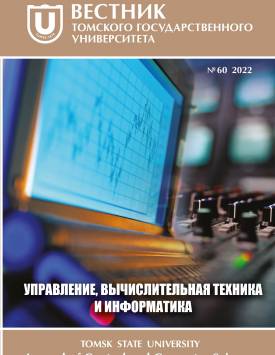Analysis and modeling of processes in complex social network structures based on the Fokker-Planck equation
The paper investigates stationary and dynamic distributions of news by the number of comments and shows that the power law of dependence of the stationary probability density of the distribution of news by the number of comments (states of the system x) observed in practice can be obtained from the solution of the stationary Fokker - Planck equation, if a number of assumptions are made during its derivation: the coefficient p(x), responsible in the Fokker - Planck equation for purposeful state change (“demolition”) of system x (x is the current number of comments on the news) linearly depends on the state of x, and the coefficient D(x) responsible for the random change (“diffusion”) depends on x quadratically. The solution of the unsteady Fokker-Planck differential equation with the assumptions made made it possible to obtain an analytical equation for the probability density of transitions between the states of the system per unit of time, which is in good agreement with the observed data, taking into account the effect of the delay time between the appearance of a comment to the news and a comment to this comment. Contribution of the authors: the authors contributed equally to this article. The authors declare no conflicts of interests.
Keywords
social networks,
modeling of social processes,
Fokker-Planck equation,
monitoring,
management,
nonlinear dynamics,
power law of distributionAuthors
| Perova Julia P. | Russian Technological University (MIREA) | jul-np@yandex.ru |
| Lesko Sergey A. | Russian Technological University (MIREA) | lesko@testor.ru |
| Zhukov Dmitry O. | Russian Technological University (MIREA) | zhukovdm@yandex.ru |
| Chechurin Alexey V. | Russian Technological University (MIREA) | chechurin@testor.ru |
Всего: 4
References
Du B., Lian X., Cheng X. Partial differential equation modeling with Dirichlet boundary conditions on social networks // Bounda ry Value Problems. V. 2018, is. 1. Art. 50.
Lux T. Inference for systems of stochastic differential equations from discretely sampled data: a numerical maximum likelihood approach // Annals of Finance. 2012. V. 9 (2), P. 217-248.
Hum A., Jeisman J., Lindsay K. Teaching an old dog new tricks: improved estimation of the parameters of stochastic differential equations by numerical solution of the Fokker-Planck equation // Financial Econometrics Handbook / G. Gregoriou, R. Pascalau (eds.). London : Palgrave, 2010
Elliott R.J., Siu T.K., Chan L.A PDE approach for risk measures for derivatives with regime switching // Annals of Finance. 2007. V. 4(1). P. 55-74.
Орлов Ю.Н., Федоров С.Л. Генерация нестационарных траекторий временного ряда на основе уравнения Фоккера- Планка // Труды МФТИ. 2016. № 8 (2). С. 126-133.
Chen Y., Cosimano T.F., Himonas A.A., Kelly P. An Analytic Approach for Stochastic Differential Utility for Endowment and Production Economies // Computational Economics. 2013. V. 44 (4). P. 397-443.
Savku E., Weber G.-W. Stochastic differential games for optimal investment problems in a Markov regime-switching jumpdiffusion market // Annals of Operations Research. 2022. V. 312. Р. 1171-1196. doi: 10.1007/s10479-020-03768-5 39
Dorogovtsev S.N., Mendes J.F.F. Evolution of networks // Adv. Phys. 2002. V. 51. P. 1079-1187.
Newman M.E.J. The structure and function of complex networks // SIAM Rev. 2003. V. 45. P. 167-256.
Dorogovtsev S.N., Mendes J.F.F., Samukhin A.N. Generic scale of the scale-free growing networks // Phys. Rev. E. 2001. V. 63. Art. 062101.
Golder S.A., Wilkinson D.M., Huberman B.A. Rhythms of social interaction: messaging within a massive online network // Communities and Technologies : Proc. of the 3rd Communities and Technologies Conference, Michigan State University. 2007. P. 41-66.
Kumar R., Novak J., Tomkins A. Structure and evolution of online social networks // Proc. of the 12th ACM SIGKDD International Conference on Knowledge Discovery and Data Mining. KDD’06. 2006. P. 611-617.
Mislove A., Marcon M., Gummadi K.P., Druschel P., Bhattacharjee B. Measurement and analysis of online social networks // Proc. of the 7th ACM SIGCOMM Conference on Internet Measurement. IMC’07. 2007. P. 29-42.
Sigov A.S., Zhukov D.O., Khvatova T.Yu., Andrianova E.G. A Model of Forecasting of Information Events on the Basis of the Solution of a Boundary Value Problem for Systems with Memory and Self-Organization // Journal of Communications Technology and Electronics. 2018. V. 18, № 2. P. 106-117.
Zhukov D., Khvatova T., Millar C., Zaltcman A. Modelling the stochastic dynamics of transitions between states in social systems incorporating self-organization and memory // Technological Forecasting and Social Change. 2020. V. 158. Art. 120134.
Zhukov D.O., Lesko S.A. Stochastic self-organissation of poorly structured data and memory realisation in an information domain when designing news events forecasting models // The 2nd IEEE International Conference on Big Data Intelligence and Computing. 2016. August 8-12, Auckland, New Zealand. doi: 10.1109/DASC-PICom-DataCom-CyberSciTec.2016.153
Zhukov D.O., Zaltcman A.D., Khvatova T.Yu. Forecasting Changes in States in Social Networks and Sentiment Security Using the Principles of Percolation Theory and Stochastic Dynamics // Proceedings of the 2019 IEEE International Conference “Quality Management, Transport and Information Security, Information Technologies”; IT and QM and IS 2019. Art. 8928295. P. 149-153.

